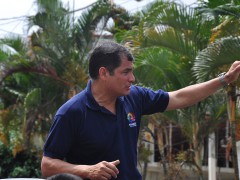Mining and Elections in Ecuador


President Correa visits Piñas in El Oro on March 19, 2012. Photo by Ralgis on Wikimedia Commons. CC-BY-SA-2.0
There is a phrase that President Rafael Correa often repeats. The last time he used it was on his official visit to Chile on October 25th 2012. On that occasion, visiting an open copper mine in Antofagasta to see how the mineral extraction process works, he said: “We cannot be beggars sitting on a sack of gold.” This refers to the mining that has begun in Ecuador which has many critics due to lack of clarity about its scope and about whether the surrounding communities were properly consulted before operations began.
So these words, on the campaign trail – which is just weeks away from its start – are a deliberate provocation.
On March 5th, 2012, the Government signed the first contract for large-scale mining with Ecuacorriente SA, a company with Chinese capital, to develop the Mirador project in the Amazonian province of Zamora Chinchipe. It’s estimated that 4.738 million pounds of copper will be extracted which would mean an income of 5.415 million dollars over 25 years for Ecuador.
In this context the President has been clear: “I take full political responsibility for these acts, and the people of Ecuador in the elections of February 2013 will decide who acted for the benefit of the majority and who just tried to win with political tricks, mediocrity and lies. The country needs these resources to develop and develop we will”, he said on October 10th. He also said that Ecuacorriente must pay advance royalties of 100 million dollars with which “Zamora Chinchipe will eliminate poverty.” And yes, criticism of the critics can be found there, too.
This reveals a contradiction when you consider that the current Constitution, promoted by Correa’s government has been a revolutionary one for its inclusion of “Nature’s Rights”. The seventh chapter of the Constitution states that “every person, community, village or nationality may require the public authority compliance with Nature’s Rights (…) the State will encourage natural and legal persons (…) to protect nature, and promote respect for all the elements that make up an ecosystem.” In the real world, it seems that the Constitution goes only so far: “The State is against Nature’s Rights and backs the extractive model, as other governments have done. It granted environmental licenses that should not be granted, such as Block 31 in the Yasuní Park,” said Jorge Hidalgo, the Ecuadorian Coordinator for the Defense of Nature and Environment, last June to El Universo, a local newspaper.
In the case of mining, a well documented “battle” is being waged. In March 2012, thousands of indigenous people from various organizations walked nearly 434 miles to Quito, in what is known as the largest protest ever against large-scale mining. There are publications about the risks of this type of exploitation signed by Alberto Acosta, a former ally of the President (he was a minister and President of the Constituent Assembly). Now he is one of his main political opponents: Acosta wants to become the new President of Ecuador and has even said that if he is elected he will suspend these projects.
For critics (on the left and in environmental organizations), such large-scale mining destroys large tracts of land, damages the biodiversity of the area and pollutes the environment with toxic waste. In their book Mining in Ecuador: Quimsacocha Water, between Greed and Life, Acosta and William Sacher argue that water pollution is a problem in areas of constant rainfall such as as the Cordillera del Cóndor where the Mirador project is located.
A few months ago, Acosta said that there is no such thing as sustainable large-scale mining, and that defending it is either “practicing a trick of speech as the government and transnational lobby do, or simply means that they don’t know anything about the subject.” For many people, the government is only looking to increase its revenues at all costs.
But that’s not all: this government bet comes up against a regulatory problem that has prevented other companies from signing other contracts. Why’s this? Because of the windfall tax which means that 70% of the increase in the price of copper or gold, as defined in the contracts, stays with the Ecuadorian State. December 7 marks the anniversary of failed negotiations between Ecuador and Canada’s Kinross for handling the North Fruit Project, also in the province of Zamora Chinchipe with reserves of 6.8 million ounces of gold. According to various sources, the company’s board did not approve the agreement because they thought it was unreasonable for them to pay a windfall tax at the start of operations as they first needed to recoup on investments made in the project.
The government has said that reform of the law is required so this tax can be charged only when investment is recovered, but this reform still hasn’t been done. The signals sent out are mixed because the government that promotes the ITT Yasuni project – for the international community to help with donations to keep the Amazon basin free from oil exploitation – is the same one that insists that this type of mining is the economic salvation of the country, and the very same one that denies any possibility of human and environmental damage.
The pattern is clear. On November 10, President Rafael Correa announced Jorge Glas as his running mate for the next elections. Glas, who was his minister coordinator of strategic sectors, was designated to “take charge of the management of strategic sectors, oil issues, and responsible mining industries, as well as telecommunications and social development”, as Correa said. And so the stakes are raised. Mining is a hot election issue in Ecuador.
Tags: Ecuador, elections, mining, natural resource extraction, Natural Resources, President Rafael Correa
